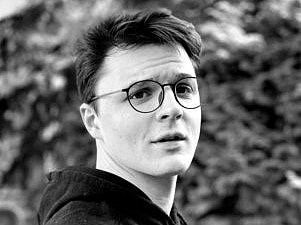Benjamin Hofbauer
Works as a PhD student at TU Delft on a project on geoengineering and normative uncertainty.
Benjamin Hofbauer is researching the ethical aspects of climate engineering. Interventions in the climate system are highly controversial among scientists.

The PELP Joint Degree is a great opportunity
I completed my PELP degree in January 2020 - a moment I still look back on with joy and a little nostalgia. My first experiences with philosophy were at grammar school, where my youthful sense of rebellion was fueled by authors such as Nietzsche and Feyerabend. However, I left my initial interest in philosophy behind to study languages. Fortunately, I couldn't give up philosophy completely and kept returning to selective ethics lectures. In the end, I decided during my bachelor's degree to devote myself fully to philosophy after graduation.
This decision was made particularly easy for me by the PELP degree program, which is unique in Austria. The idea of working on philosophical aspects of politics, economics and law in seminars, reading texts and books and learning from discussions presented itself to me as a unique opportunity. Seminars and courses gave me deeper insights into the problems of practical philosophy and applied ethics, covering a wide range of topics. PELP offers students a wide range of opportunities for specialization, from political philosophy, environmental and climate ethics, to philosophy of law and economics, through collaboration with other departments at the university. The wide range of courses covers numerous subject areas. Due to the manageable size of the seminar groups, the lecturers are able to respond to students' individual questions and provide valuable support. This inspiring atmosphere helped me to find a topic for my Master's thesis after the first year. I decided to write about the ethical implications of technological mitigation strategies of climate change in the form of Carbon Capture & Sequestration.
Based on my decision, I was encouraged by my supervisor to switch to the joint degree, i.e. the PELP program in cooperation with Ruhr University Bochum. I spent a semester at the PELP partner university in Bochum to further develop the topic of my Master's thesis there. Thanks to the support of the University of Graz and the Ruhr University Bochum, this move was straightforward and I moved into student accommodation in Germany just a few months after my transfer. Complementing and deepening the courses I had completed in Graz, I was supported by my second supervisor in Bochum. My approach to philosophy was significantly broadened by this semester abroad, which made this time crucial for the development of my academic ambitions.
After my return, I started working for my supervisor as a tutor for one of his lectures. At the same time, I had taken up a position as a policy advisor, which allowed me to apply the theoretical superstructure of philosophical thought as well as bring a certain amount of reflection to regional policy issues. By the time I finished my PELP degree, I was working both as a student assistant and in politics. Eventually, I decided to accept an internship at the European Parliament in Brussels. At first I thought that this would probably be the end of my philosophical career, but - as before - I couldn't stop philosophizing for long. After completing my internship, I took up a PhD position at TU Delft in the Netherlands, where I am currently working on geoengineering and normative uncertainties as part of a larger project.
The PELP program has offered me a wide range of opportunities. I would recommend the course to anyone who likes to combine ethical issues with practical problems and enjoys open discourse and diverse reading. One of the most essential elements that the PELP course and philosophy in general has given me and continues to give me on a daily basis is the incessant need to ask questions. The openness to grapple with the answers to these constant questions is also, I believe, why PELP provides an excellent career foundation beyond academic careers in the public and private sectors. I think that critical reasoning as a tool, combined with a sense of justice, are useful and attractive skills for a wide range of career opportunities. This is especially true in times of increasing uncertainty and ever more obvious injustices.